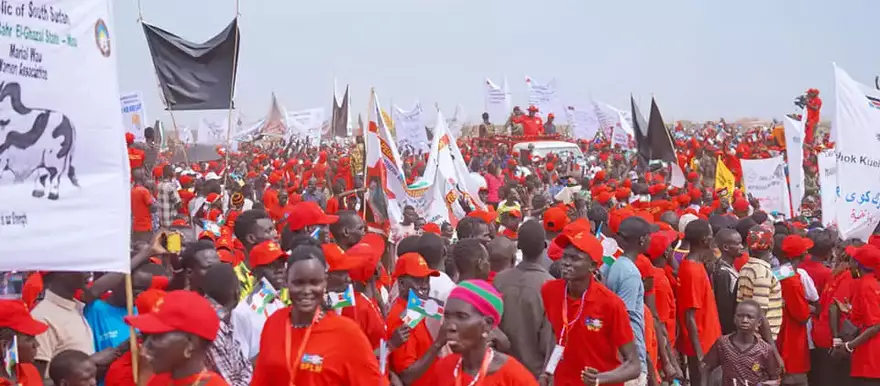President Salva Kiir’s recent statement at the swearing-in ceremony of the new Minister of Youth, Dr. Joseph Geng Akech, raises an important question – have the youths of South Sudan truly forgotten what the Sudan People’s Liberation Army (SPLA) fought for? While the President claims that the younger generation has lost sight of the sacrifices made during the liberation struggle, it is essential to reflect on the reasons behind their apparent discontent. Instead of blaming the youths for their lack of appreciation, President Kiir should take a moment to introspect and consider why the citizens, including the youth, are not happy.
It is crucial to acknowledge that the youths of South Sudan are facing numerous challenges that hinder their ability to fully embrace the ideals and values fought for by the SPLA. Decades of conflict, political instability, and economic hardships have left a deep scar on the nation’s young population. Unemployment rates are soaring, education opportunities are limited, and basic services remain inaccessible to many. President Kiir must recognize that the disillusionment among the youths is a direct consequence of these pressing issues, rather than a mere neglect of history. Instead of admonishing the youths, it is high time for President Salva Kiir to accept his unrecoverable failure that has trashed the very reasons for the liberation of South Sudan. The citizens who once fought alongside him against oppression and injustice are now left disillusioned and betrayed. The dreams of a prosperous and united nation, for which blood was shed, have been shattered under his leadership.
It is disheartening to witness the President’s inability to address the deep-rooted issues that plague our nation. Corruption, tribalism, and nepotism have become rampant, undermining the principles of equality and fairness that were once the cornerstone of our struggle for freedom. Instead of fostering unity and reconciliation, President Kiir has allowed divisions to deepen, exacerbating ethnic tensions and fueling violent conflicts across the country. The very ideals that the SPLA fought for have been forgotten, overshadowed by a leadership that prioritizes personal gain over the well-being of the people. It is time for President Kiir to take responsibility for his failures and work towards rebuilding the trust and unity that South Sudan so desperately needs.
Mr. President, one of the most pressing challenges you face now is the absence of democracy, as you have not been elected for nearly 15 years. This contradicts the principles of democracy. While we do not expect immediate and drastic changes, it is worth noting that aligns with the values which the SPLM/A has fought for is necessary. Conducting free, fair, and credible elections would be a significant step in the right direction if you wanted to correct the past mistakes committed by your government. To ensure this, it is crucial that you do not impede the implementation of the agreement and that every decision you make adheres to the provisions of the R-ARCSS.
In order to effectively lead the nation, your own youths look to you for improved leadership. Therefore, here are some personal recommendations to foster the establishment of democracy and the conduct of free elections:
1.Promote political pluralism: Encourage the formation and participation of multiple political parties, allowing for a diverse range of voices and perspectives. This can be achieved by removing barriers to party registration and creating an inclusive political environment.
2. Safeguard freedom of speech and press: Protect the rights of citizens to express their opinions freely and without fear of reprisal. Ensure that journalists and media outlets can operate independently and without censorship, thereby fostering a vibrant and informed public discourse.
3. Strengthen the rule of law: Ensure independency and impartiality of judiciary to uphold the principles of justice and accountability. This includes ensuring fair and transparent legal processes, combating corruption, and promoting the separation of powers.
4. Foster civic education: Invest in civic education programs to promote awareness and understanding of democratic values, rights, and responsibilities among the population. This will empower citizens to actively participate in the democratic process and make informed decisions.
5. Engage in dialogue and reconciliation: Facilitate inclusive and constructive dialogue among different political factions, ethnic groups, and civil society organizations. Encourage reconciliation efforts to heal past divisions and promote national unity.
6. Ensure security sector reform: Implement comprehensive reforms within the security sector to ensure professionalism, accountability, and adherence to human rights standards. This includes training and equipping security forces to protect citizens’ rights and maintain public safety without undue use of force.
7. Encourage youth participation: Empower and involve young people in the democratic process by creating opportunities for their meaningful participation in decision-making, politics, and governance. This can be achieved through youth leadership programs, mentorship initiatives, and targeted policies.
8. Engage in partnerships that promote democratic values and strengthen democratic institutions.
It is important to emphasize that these recommendations are personal and intended to contribute to the broader conversation on democratic reforms. The transition to democracy necessitates a comprehensive and inclusive approach, involving all stakeholders and prioritizing the long-term stability and prosperity of the nation. Finally, your Excellency it’s time to wake up and take the country out of the problems her people are facing rather than finger pointing to one another.
The author, Emmanuel Mangok Deng, is former Secretary for Political Mobilization and Organization SPLM-IO Youth League in Northern Bahr el Ghazal State.
The views expressed in ‘opinion’ articles published by Radio Tamazuj are solely those of the writer. The veracity of any claims made is the responsibility of the author, not Radio Tamazuj.




